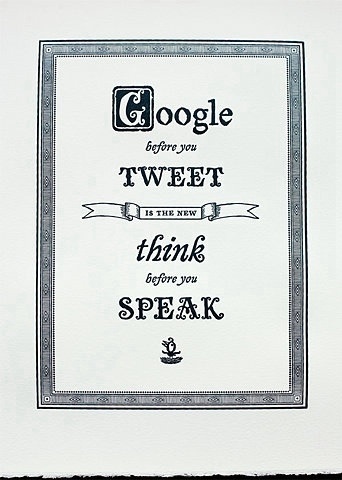 Do you still remember the days when everyone knew that “tweet” referred to the sound that birds make? Those were the days when there was no confusion as to what the speaker meant.
Do you still remember the days when everyone knew that “tweet” referred to the sound that birds make? Those were the days when there was no confusion as to what the speaker meant.
How about the days when your mom may not have known what you meant when you said “Google”? Those days are long gone, and these two words have become so pervasive that even little children know what they mean. More so, kids use them on a regular basis!
There is one thing about the use of the words “Twitter”, “Google”, and their derivatives that may not be so clear, though. Used as proper nouns – the trademarks – there is no doubt about how we write them. We capitalize the first letter of the word. I am willing to bet my month’s earnings on that. 😉
With the way things have evolved, however, new words and uses have arisen. “Google” is also used as a verb. See the example below.
Why don’t you Google the restaurant’s location?
In this case, was I right to capitalize the first letter of the word, or should I have written “google” instead since it is used as a verb? Here is another example.
He tweeted that he was not feeling well.
Should I have capitalized the first letter, or did I get it right this time?
I have read various opinions on this, and the conclusion seems to be that people choose whichever method depending on their personal preference. As usual, I go to my most trusted source: Merriam-Webster.
Interestingly, it gives different answers for the two words. It defines “Google”, used as a verb, as: “to use the Google search engine to obtain information about (as a person) on the World Wide Web”. There is also an additional note saying that the verb is “often capitalized”. The example given is below. ((Source))
Then where are they going, if not to Faulkner and Achebe and Naipaul? … To the movies; to television (hours and hours); to Googling obsessively (hours and hours); to blogging and emailing and text messaging…
To be honest, I tend to use lowercase for the verb, but from now on, I hope to be consistent with the example given above.
As for “tweet”, Merriam-Webster takes on a different stance. ((Source)) The definition is: “to post a message to the Twitter online message service”. The first letter of the word is not capitalized, nor is there any note about that point.
That solves it for me. How about you? Do agree with these “rules”? Why or why not?
Image via NightRStar


Leave a Reply